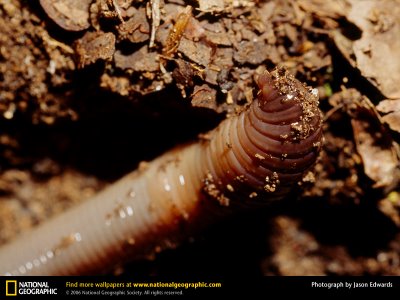As the Worm Turns

Sometimes the simplest things can take care of the most complex problems.
Take groundwater contamination, for instance.
Just ask anyone at the EPA or the DEP about groundwater contamination and they'll start talking about "air-strippers," the mechanical solution currently used to separate contamination from the groundwater it has polluted.
That's how, in most cases, water polluted with a solvent called trichloroethylene, more often known as TCE is treated. A solvent and de-greaser used heavily in industry for decades, it is fast turning into the nation's number one groundwater pollutant.
Around here, it is known to be polluting groundwater in the Collegeville area, near to narrow tube plants, and at the former Occidental Chemical site in Lower Pottsgrove.
Other pollutants commonly found in groundwater are heavy metals and, out west, uranium where Cold War mining and processing fostered a boom on atom bomb production (pun fully intended).
And while there's currently no easy fix for TCE, it's starting to look like, as is so often the case, nature may provide the answer for one or two of the other problems mentioned here.
This article in National Geographic illustrates a discovery by scientists that a certain microbe can be trained to render uranium inert, and make it "fall out" of groundwater where it can more easily be cleaned up.
According to the magazine article, published in 2004, "the microorganism, called Geobacter sulferreducens, has a unique metabolism — it passes electrons onto metals to get energy from its food in the same way that we humans breathe in oxygen to break down our food.
"In the electron transfer process, the microorganism changes the metals from their dissolved, or soluble, form to a solid, or insoluble, form. This causes the metal to fall out of the groundwater."
Now if you don't think that's cool, you're just watching too damn much "American Idol."
Slightly larger, but no less interesting, are the new "Super Worms."
Scientists in England have recently discovered that certain types of worms can help process all types of heavy metals contaminating soil, including lead, zinc, arsenic and copper.
Also highlighted in National Geographic here, this worm, so new it hasn't yet been named, has a real love for heavy metal, and no, we're not talking about Metallica here.
This species has an enzyme or protein that encases tiny grains of arsenic to make them inert and not harmful to the worm.
Another worm species, found in my ancestral homeland of Wales, does the same with lead.
The protein or enzyme wraps eventually degrade, but until they do, they make it much easier for the metal to be taken up by plants, thus bringing the contaminant to the surface where it can be more easily cleaned-up.
According to the article, the long-term aim is to breed and then release the worms at polluted sites to speed up the process of soil development and help kick-start the ecosystem's rehabilitation. Plants could be used to extract toxic metals once the superworms have got to work.
The downside, of course, is that worms are not fast workers. They cannot compete with the clean-up methods now used.
And given that it is expected to take decades to clean up the TCE contamination in this region using conventional methods, we shouldn't be looking to the worms for salvation any time soon.
They do have another, more immediate use, however.
According to the scientists doing the study, "basically you can see the earthworms as biological dipsticks of the soil toxicity and the metal levels."
But hey, we'll take anything that helps at this point.
As the world gears up for the next big natural resource shortage crisis -- fresh water -- we'll need every trick we have to clean up the water we've so carelessly polluted.
Labels: arsenic, copper, Geobacter sulferreducens, lead, TCE, uranium, zinc
 RSS
RSS

